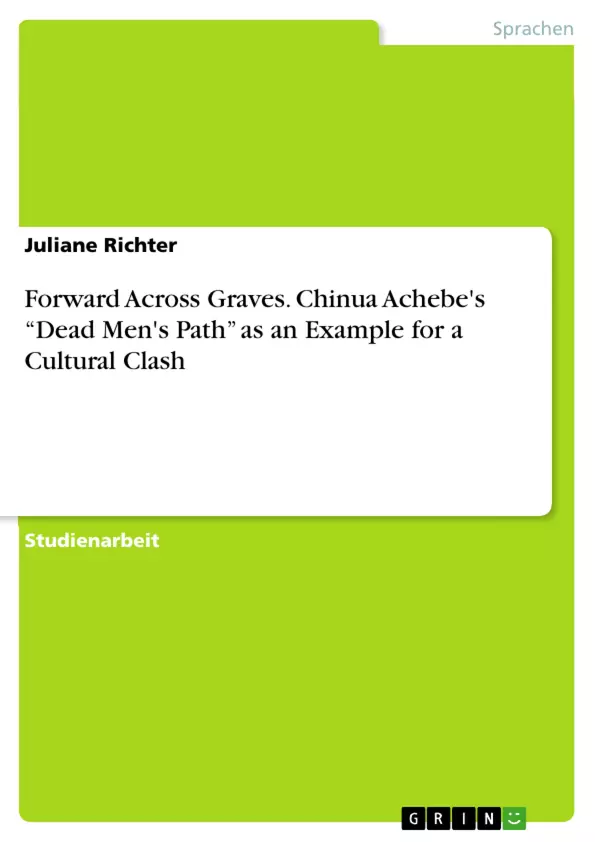In the following paper the author wants to explain the main conflict shown in the short story "Dead Men's Path" by Nigerian author Chinua Achebe, bring it into context to his biograph and constantly recurring mistakes mankind makes on the other hand.
In western society every woman and every man is taught that it is of utmost importance to reach one´s goals and become successful is one of the main fields of life. As a result, many young people fight for their dreams neither looking left or right. Throughout history, progress and innovation were two of the most important catchphrases and through all times in history the “more educated and more modern” people thought it was the most important thing to bring their new knowledge, lifestyle and ideas to the more backward ones since that would make their life so much better. But just these notions are wrong. Contact with other cultures and bringing new ideas doesn´t change minds! And exactly this is the main theme in the short story “Dead men´s path” by Chinua Achebe which was published in 1953. This issue, Achebe points out, has its roots in his own biography and is a recurrent theme of many of his novels and poems.
Inhaltsverzeichnis
- Introduction
- Coherence between the biography of the Author Chinua Achebe and the issue of a cultural clash
- Biography
- Cultural clash
- Summary of the short story
- Main content
- Analysis of setting, time and voice
- Characterization of the main characters
- Main conflict of the text
- Main problem
- Different points of view shown in the text and stylistic devices used by the author to make clear his preferences regarding point of view
Zielsetzung und Themenschwerpunkte
Die vorliegende Arbeit analysiert die Kurzgeschichte „Dead men's path“ von Chinua Achebe im Kontext seiner Biografie und der sich darin spiegelnden kulturellen Konflikte. Der Schwerpunkt liegt auf der Erörterung des Hauptkonflikts der Geschichte und dessen Beziehung zu Achebes persönlichen Erfahrungen mit Kolonialismus und kulturellem Wandel.
- Der kulturelle Konflikt zwischen westlichen und traditionellen afrikanischen Werten
- Die Auswirkungen von Kolonialismus auf die afrikanische Gesellschaft
- Die Bedeutung traditioneller Bräuche und Überzeugungen
- Die Rolle von Bildung in der Entwicklung der afrikanischen Gesellschaft
- Der Einfluss der persönlichen Biografie auf die literarische Arbeit eines Autors
Zusammenfassung der Kapitel
Die Arbeit beginnt mit einer Einführung in das Thema der kulturellen Konflikte und stellt die Verbindung zwischen Achebes Biografie und der in der Kurzgeschichte „Dead men's path“ dargestellten Problematik her. Im nächsten Kapitel wird die Biografie des Autors beleuchtet, wobei insbesondere seine Erfahrungen mit Kolonialismus und die Auswirkungen auf seine literarische Arbeit hervorgehoben werden. Anschließend wird die Kurzgeschichte „Dead men's path“ zusammengefasst, wobei der Fokus auf den zentralen Konflikt zwischen dem modernen westlichen Bildungsverständnis und den traditionellen afrikanischen Bräuchen liegt.
Schlüsselwörter
Die Arbeit beschäftigt sich mit den zentralen Themen des kulturellen Konflikts, des Kolonialismus, der traditionellen afrikanischen Kultur, der modernen Bildung, der Bedeutung von Bräuchen und der Auswirkungen der Biografie auf die literarische Arbeit. Der Fokus liegt auf der Analyse der Kurzgeschichte „Dead men's path“ von Chinua Achebe als Beispiel für die Herausforderungen des kulturellen Wandels in Afrika.
Häufig gestellte Fragen
Was ist der zentrale Konflikt in Chinua Achebes „Dead Men's Path“?
Der Hauptkonflikt besteht zwischen dem modernen, westlich orientierten Fortschrittsglauben des Schulleiters Michael Obi und den tief verwurzelten traditionellen Bräuchen der Dorfgemeinschaft.
Welche Rolle spielt die Biografie von Chinua Achebe in diesem Werk?
Achebe verarbeitet in seinen Werken oft seine eigenen Erfahrungen mit dem Kolonialismus in Nigeria und den daraus resultierenden Spannungen zwischen afrikanischer Identität und westlicher Bildung.
Warum ist der Pfad für die Dorfbewohner so wichtig?
Der „Dead Men's Path“ ist ein ritueller Weg, der das Dorf mit dem Friedhof verbindet. Er symbolisiert die Verbindung zwischen den Lebenden, den Toten und den Ungeborenen.
Welche Kritik übt Achebe an der modernen Bildung?
Achebe zeigt auf, dass Bildung, die lokale Traditionen ignoriert oder herabwürdigt, zu Konflikten führt. Er kritisiert die Arroganz derer, die glauben, „rückständige“ Kulturen gewaltsam modernisieren zu müssen.
Wie endet die Geschichte und was bedeutet das Ende?
Nachdem Obi den Pfad sperrt, wird die Schule verwüstet. Das Ende verdeutlicht das Scheitern einer Modernisierung, die keinen Respekt vor der kulturellen Identität und den Ahnen zeigt.
- Citar trabajo
- Juliane Richter (Autor), 2011, Forward Across Graves. Chinua Achebe's “Dead Men's Path” as an Example for a Cultural Clash, Múnich, GRIN Verlag, https://www.grin.com/document/311097



